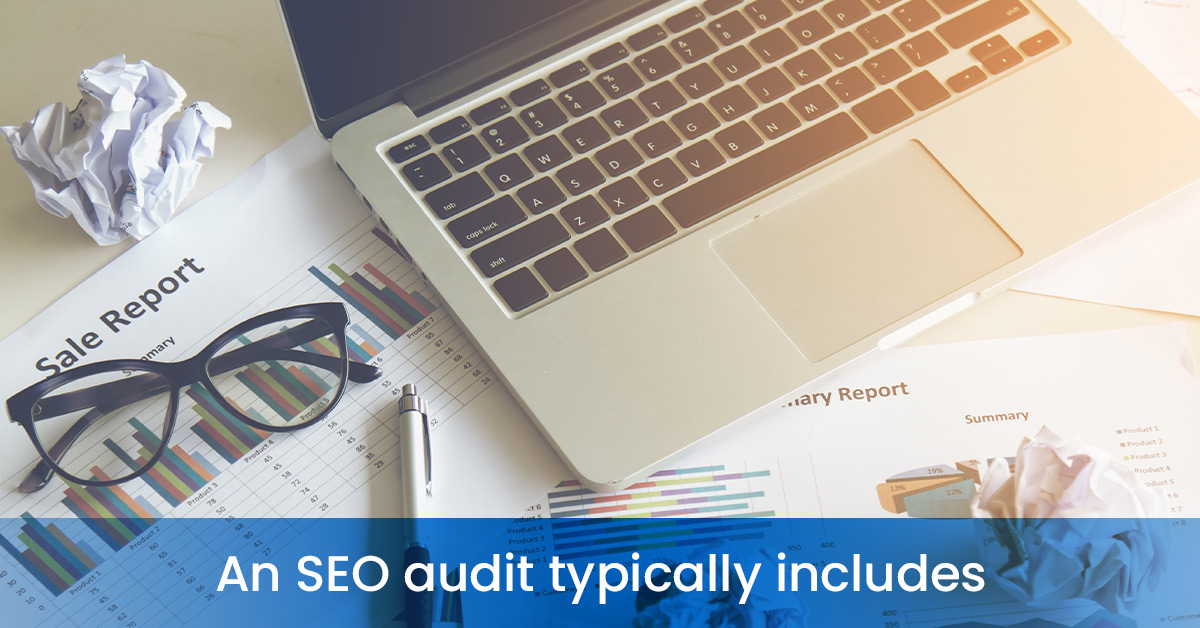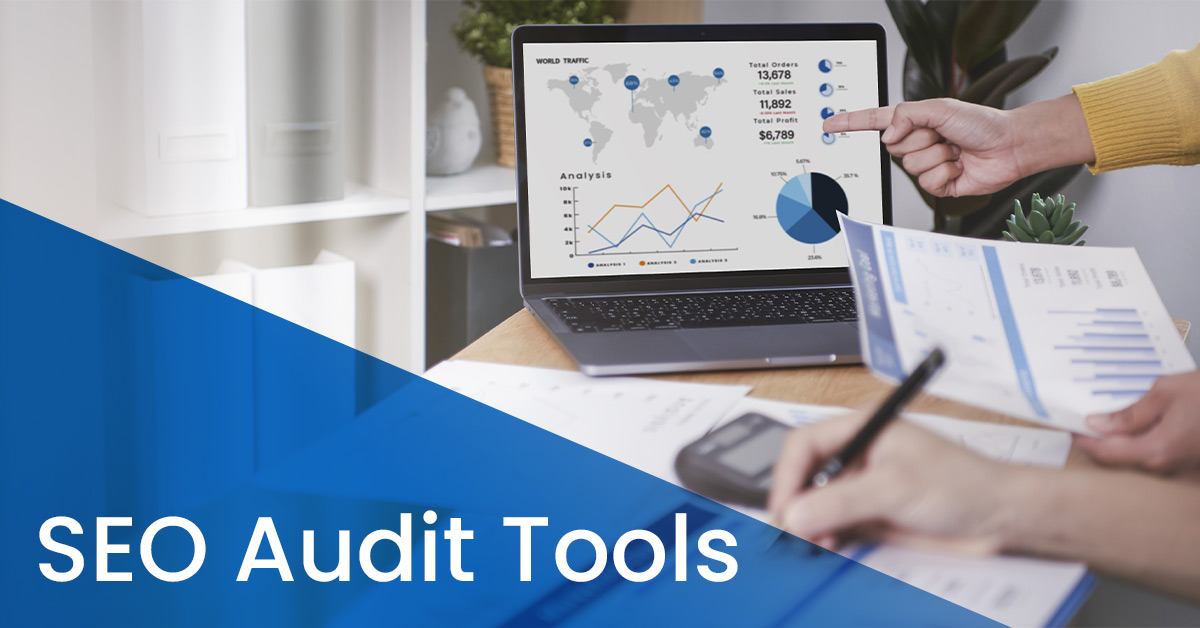SEO plays a major role in the marketing strategy of any business. SEO decides your brand’s/ business’s authority in your industry. If you’re ranking amongst the top, then you will be considered among the top. That’s the bottom line.
If you are a business owner and planning to hire an SEO services company then SEO audit is a service from which you can judge any agency that provides SEO services in Delhi (or wherever you are).
So what is the key to planning a great SEO strategy for your business? Is it content? Yes. Is it securing high-quality backlinks? Indeed it is! But before all these major things. It is imperative to check where you stand.
And that is done by executing a great SEO Audit.
In this post, you will learn all about SEO Audits, tools to do a great SEO Audit yourself, and how to interpret your audit report.
What is an SEO audit?

An SEO audit is a process of evaluating your website’s performance and comparing it to industry benchmarks. An SEO audit aims to ensure your site is optimized for search engines so that it can rank high in search results when people search for relevant information.
How does it work?
An SEO audit often involves a professional review of the current ranking metrics for your site’s keywords and competitors’ websites, as well as an analysis of your content. This analysis can include:
-A look at the number of backlinks pointing to your site from other sites in the industry
-An assessment of the number and quality of links pointing to your site from other websites in the industry
An SEO audit typically includes:

1. Content analysis
A content analysis examines your website’s text, headings, meta tags, images, and other content to ensure that it meets the quality guidelines set by Google.
2. On-page factors
In addition to examining your website’s content for quality purposes, an on-page factors analysis also checks for user-friendly design, correct titles, and descriptions, missing alt tags, and other factors that could impact search engine rankings.
3. Off-page factors
Off-page factors examine off-page elements like backlinks, social signals (like Facebook likes or Twitter followers), links from related websites, and more.
4. Technical SEO audit
A technical SEO audit focuses on the technical side of search engine optimization (SEO). The technical side of search engine optimization refers to how well a website is coded, and how well it’s configured for search engines. A technical SEO audit looks at your site’s code, as well as its configuration, to determine if it meets Google’s requirements for SEO.
5. Local SEO Audit
A local SEO audit takes a broader view of your business and its online presence. It looks at all the different factors that are important to local businesses from your physical location to the names of your products and services to determine what these elements need to rank higher in search engines.
SEO Audit Tools

These are some of the most popular SEO audit tools available today.
1. Google Search Console
Google Search Console is a free tool that lets you see how your site is doing in the eyes of Google. You can see how well your site ranks for specific keywords, whether people are clicking on it, and more.
2. GTmetrix
GTmetrix offers a free report on your website’s organic traffic, backlinks, and other details. You can also get access to paid reports, which include things like social media engagement and keyword performance.
3. Screaming Frog
Screaming Frog is another great tool for getting a handle on your website’s performance in terms of keywords and rankings. It offers both free download and paid plans with additional features such as crawl error reporting and keyword research.
4. Page Modified
Page Modified tracks how often your website pages rank for different keywords over time so that you can see which ones are getting traffic or being visited less often over time (and what you can do about it). The free version only shows you one month’s worth of data at once.
5. SEMrush
SEMrush is a comprehensive tool that provides a set of metrics to help you understand your current level of SEO performance and determine what areas you need to focus on. It also provides tools for analyzing competitor sites, backlinks, and more.
6. Ahrefs
Ahrefs is an industry-leading SEO tool that gives you access to enormous data on your competitors, including rankings, traffic statistics, keywords, and more. You can use this data to identify opportunities for improvement in your site and find out where your competitors are excelling.
7. Deep Crawl
A deep Crawl is a great tool for finding out how well your site is doing in terms of Google rankings. It analyzes keywords to give you valuable insights into how your content performs on page one.
Some common issues that are universal to every SEO audit
1. Complete your google my business profile
If you’re interested in increasing your ranking on Google, the first thing you need is a Google Business Profile. This is a free and easy way to get your business on Google’s radar and start seeing results.
1. Fill out your profile
2. Add some relevant information about your business
3. Upload photos of yourself and/or your products/services
5. Start posting content so people can find you
2. Improve the speed of your website
When it comes to ranking in search engines, speed matters. The faster your site loads, the better it looks to users and the more likely they are to click on it.
If you have a slow website, then you’re losing out on potential customers and sales. You could be missing out on revenue that your competitors are making.
You can improve your website speed by optimizing your site with the following:
-Remove unnecessary elements and images
-Minify CSS and JavaScript files
-Use a CDN to load your website assets faster
-Use HTTP/2 with gzip compression on all pages
-Enable caching on all pages, especially those that are frequently accessed
3. Keyword Research
Keyword research is an essential part of the SEO process. The idea is to find keywords that are going to be used in your content and optimize them so they’re as relevant as possible. Doing this will help you rank higher on Google, which is a big part of being an effective SEO professional.
You can start by looking at what other pages in your industry are ranking for these keywords, then try creating similar content but using different variations on those words. This way, you’ll be able to see how well your site performs with different types of keywords and the different uses for each keyword.
4. Make your content is informative
If you’re looking to increase your search rankings, the first step is to make sure that your content is informative. It’s important to include keywords in your content and make sure it’s keyword-optimized so that search engines can find it easily. Even if your page isn’t ranking for any specific keywords, adding “keyword” to the beginning of each sentence in your posts can help ensure that your content is relevant and engaging.
5. Create Authority
Create high-quality content that is relevant to your industry and helps your audience. Your content needs to be helpful, useful, and interesting. You need to make sure that your content is engaging and has SEO potential.
Get Links from High Authority Websites
You can get links from other websites that have authority in your industry or area of interest. You should create a list of websites with high authority in your niche and contact those sites directly asking them if they would be willing to link back to you.
Submit Content to High-Quality Content Sites
You should submit your articles and videos to high-quality content so that they rank well on search engines such as Google and Bing.
Write Guest Posts on Popular Blogs
Guest posting on popular blogs will help increase your ranking on search engines like Google and Bing because these blog owners are likely to link out to you when they publish your article or video content on their blog!
6. Make sure Your Website is Secure
The more you keep your website secure, the more likely it is you’ll be able to rank on Google.
Secure websites are harder for hackers to break into. So if your website has lots of vulnerabilities, then Google will see them and lower your ranking. You can do this by making sure all of your pages have HTTPS:// in the address bar and making sure that you don’t have any viruses or malware on your site.
Also, make sure that all of the files on your website are properly titled and named so that Google can read them correctly.
7. Fix Broken Links
A broken link is one of the biggest reasons why you may be getting low rankings in Google and Yahoo! Search. If you have a page but no links to it, then it’s going to be hard for Google or Yahoo! to find it. It’s worth checking every link on your site to make sure they all work properly.
In conclusion,
The main reason why you should hire an SEO service is that it saves you time and money. You don’t need to spend hours trying to figure out how to write great content for your website or blog. The experts can handle everything for you, so all you have to do is sit back and relax as they work their magic.
Of course, there are other benefits as well. For example, you can use the time that would have been spent on writing content to focus on other aspects of your business like marketing strategy, growth hacking, or sales funnel optimization. And if nothing else, hiring an SEO service will help ensure that your site gets found by more potential customers who are searching for what you’re selling!




